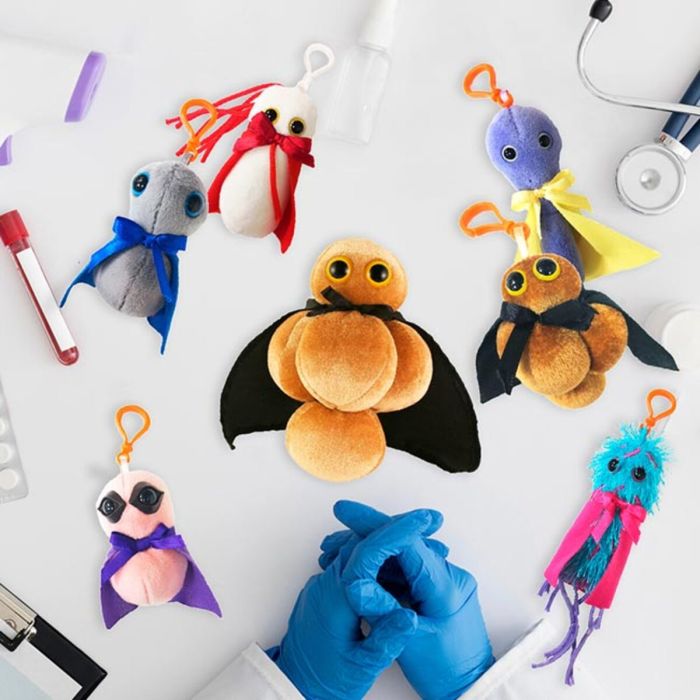Superbug 6-pack
Out of Stock
This extraordinary pack of little baddies includes 6 mini (2-3") superbugs with key chain clips and adorned with supervillain capes: Clap, C.diff, MRSA, Pneumonia, Pseudomonas and Salmonella.
Product Details
Additional Information
| Sizes | Giantmicrobes are based on actual microbes, cells, organisms and other critters, only 1,000,000 times actual size! Gigantic (GG) 40-60cm XL (XL) 25-38cm Original (PD) 12-20cm Keychain (KC) 5-10cm with clip |
|---|---|
| Materials | Plush from all new materials. Stuffed with polyester fiber fill. Surface washable: sponge with water & soap, air dry. |
| Packaging | Each plush microbe includes a printed card with fun, educational and fascinating facts about the actual microbe or cell. |
| Safety | Every product meets or exceeds U.S. and European standards for safety. For ages 3 and up. |
All about Superbug 6-pack
The post-antibiotic era of superbugs has arrived! The story of antibiotic-resistant superbugs is complicated and not a very happy tale. But this is a critically important subject that we all should learn about. Since Alexander Fleming discovered penicillin, all antibiotics have been two-faced with benefits and disadvantages closely intertwined. Antibiotics cure bacterial infections and have saved millions of lives. Yet overuse of antibiotics has created vast populations of drug-resistant superbugs that eat our antibiotics for breakfast!
Pneumonia
Pneumonia is a lung infection in which the small, air-exchanging sacs of the lungs (called alveoli) become inflamed and filled with fluid. It can come on suddenly and in serious cases it can take your breath away.
There are a number of causes of pneumonia, ranging from viruses to fungi to parasites to physical injury. The most common cause is Streptococcus pneumoniae.
Pseudomonas
Pseudomonas is a genus of common bacteria that lives in soil and water. Most species are harmless, yet some are opportunistic pathogens that will infect animals, plants and people. Pseudomonas aeruginosa is the type frequently associated with human disease.
In recent years, P. aeruginosa has evolved into a superbug resistant to most commonly used antibiotics.
Clap
The clap, or gonorrhea, is one of the most common sexually transmitted diseases. (The word "clap" comes from "clapier," the old French word for brothel.)
Gonorrhea is generally contracted by young adults, as promiscuity is the primary risk factor. Though most cases of the clap can be treated with antibiotics, hold the applause: resistant strains are beginning to emerge.
Salmonella
Discovered in 1885 by American veterinarian Daniel E. Salmon, Salmonella bacteria are among the leading causes of food poisoning in the world.
Poultry and eggs are among the most favored habitats for Salmonella – and should be handled with care. Unsanitary kitchen practices are often responsible.
C. Diff
Clostridium difficile, or C. diff for short, is a very common bacteria found in water, air, soil, and many other environments. However, it is becoming notorious as a cause of infections contracted in healthcare settings such as hospitals and nursing-homes. It can cause severe diarrhea and cramping, as well as inflammation of the colon – and in some instances it can be life-threatening.
MRSA
MRSA is a very common bacteria often found growing harmlessly on the skin. But some strains of this “superbug” are now resistant to virtually all known treatments.
The best way to prevent the spread of MRSA is to practice simple hygiene (such as hand-washing) and to complete any regime of prescribed antibiotics.









